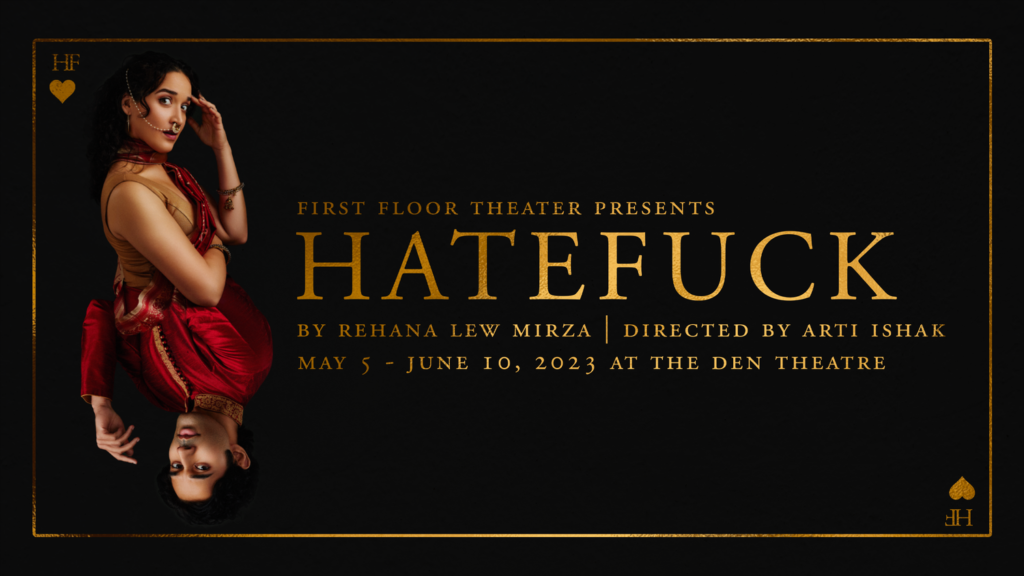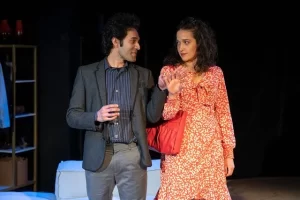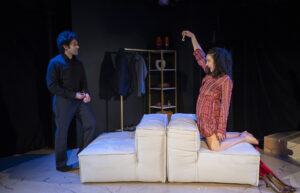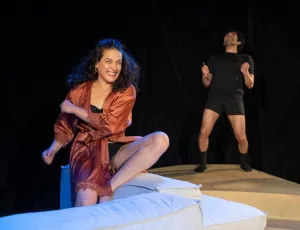
 [rating=3]Despite its shocking and sophomoric title, “Hatef*ck” is a lot deeper and more forceful than one might initially imagine. Brilliant dialogue, wonderful acting, and great direction unite in a vigorous and intriguing performance, having to do with issues of identity and what it means to be a Muslim in the contemporary United States. Cleverly written by Rehana Lew Mirza, this romantic drama introduces us to Imran (Faiz Siddique), a well-renown writer of fiction, and Layla (Aila Peck), a professor at Wayne State University. The two meet up at a party thrown in Imran’s apartment in honor of the publication of his latest novel. It is then and there that the couple notices that they are the only brown people in the room and that they both have gained some measure of success within white-dominated American society. Once the remaining guests leave, it’s time for them to explore their passions. Sexually they seem very compatible. Yet just because both are Muslim does not mean that they view the world in the same way or that they share the same values.
[rating=3]Despite its shocking and sophomoric title, “Hatef*ck” is a lot deeper and more forceful than one might initially imagine. Brilliant dialogue, wonderful acting, and great direction unite in a vigorous and intriguing performance, having to do with issues of identity and what it means to be a Muslim in the contemporary United States. Cleverly written by Rehana Lew Mirza, this romantic drama introduces us to Imran (Faiz Siddique), a well-renown writer of fiction, and Layla (Aila Peck), a professor at Wayne State University. The two meet up at a party thrown in Imran’s apartment in honor of the publication of his latest novel. It is then and there that the couple notices that they are the only brown people in the room and that they both have gained some measure of success within white-dominated American society. Once the remaining guests leave, it’s time for them to explore their passions. Sexually they seem very compatible. Yet just because both are Muslim does not mean that they view the world in the same way or that they share the same values.
Imran prefers to write novels where Muslims are terrorists and where all women are subjugated to men. From his standpoint (and that of his agent Duncan), these books will sell, and he will gain fame and fortune from writing them. Layla, however, is offended by Imran’s writings. She decries the negative and untrue stereotypes that he promotes and will never put his books on her college syllabus. In fact, one could argue that Layla has entered into her relationship with Imran in order to change him and make him realize the error of his ways. In fact, when the couple gets closer romantically, it seems as if each individual is willing to step out of their own box, if only for a moment. Each briefly imagines that the other is seeing the world from their perspective—and for a short while, it seems as if Layla might be making inroads into Imran’s worldview. But all this turns out to be illusory. The main similarity between the two people, ironically, is that they both embrace a modern American vibe with regard to expressing their sexuality energetically, separate from traditional marriage. While Layla may have turned Imran’s sexual world upside-down (as in the Eric Clapton song), she cannot turn his worldview upside-down.
Layla resents that those outside of the culture are defining what Islam is, rather than obtaining a true picture of the religion and its adherents. Specifically, Layla hates Imran when she believes he is catering to the prejudices of the dominant white population in his writings, although she never goes so far as to say that he is self-hating. Instead, she insists that he really wants to write about significant issues such as climate change and what is happening in Syria. But perhaps she is projecting her own attitudes on him! Over time, however, she realizes that Imran is incapable of understanding the world from a more essential Muslim point of view: This is largely because he receives his cues from mainstream American culture and does not care to educate himself about the philosophy, literature, and history of his own people. Inasmuch as Imran wants to gain fame and admiration for his writings (and will write almost anything to achieve this), Layla’s intentions are much purer: She wants to be a fully published author in order to relay the truth. In so doing, she tells Imran that she is trying to get her own nonfiction book published on the life experiences of a Syrian translator during the recent war. Fundamentally, while both are authors, they remain poles apart in their motivations for writing, what they choose to write about, and what they value with respect to their careers.
Arti Ishak’s direction works very well for such a small stage, and it includes some travel within the aisles. The scenic and props design by Paloma Locsin is very simple: largely black curtains with a shelving unit, a clothes rack, and a faux marble floor. We watch the actors configure and reconfigure the white multi-component moveable couch to form all sorts of furniture. This allows us to distinguish one scene from other—it nicely keeps things in motion—although most settings take place in Imran’s apartment. Isaac Pineda’s costumes are all on the mark regarding today’s styles, and costume changes are frequent and interesting, especially as we see the actors change clothes on stage. Lighting by Vianey Salaza is perfect, and Troy Cruz’s sound design is good, although I found the music to be somewhat too loud at the beginning and at the end of the performance. Best of all is Samantha Kaufman’s fight and intimacy design: doing incredible work with regard to all of the sex scenes and those containing some amount of violence. I was impressed with the graphic design advertising the show. Using a playing card (containing a QR code) to serve as both the admission ticket and the program for this event is especially creative.
In all, the excitement of sexual attraction cannot override the fact that Layla and Imran are not compatible as a couple. Much of this has to do with how they relate to the Muslim faith as well as their beliefs concerning what it means to be successful in life and even what it means to be a human being. Layla understands women’s independence in a way that Imran does not. In this vein, she finds it unforgivable that Imran cannot put himself in a woman’s shoes and see the world from the perspective of being female in a largely male-dominated culture, whether it be mainstream American culture or traditional Muslim culture. To my mind, a show like this one (which is meant to point up differences between lovers) was never meant to have an unrealistic and fanciful Hollywood ending—and I’m not ruining the play for you by saying this! It was obvious to me from the onset that the tightly self-examining script was written by a woman, and I am grateful for it!
“Hatefuck” is playing through June 10, 2023 at The Den Theatre, 1331 N. Milwaukee Avenue, in Chicago’s Wicker Park neighborhood.
Tickets: $0-$35*
*“In the spirit of bringing accessibility to the theatre, a limited number of free tickets are available for each performance. Use the code FREE to unlock one complimentary ticket (subject to availability).”
 Performance schedule:
Performance schedule:
Thursdays, Fridays, and Saturdays at 8:00 p.m.
Sundays at 3:00 p.m.
Additional performance: Saturday, June 10 at 3:00 p.m.
Industry nights: Monday, May 22 at 8:00 p.m. and Monday, June 5 at 8:00 p.m.
Understudy performance: Wednesday, May 31 at 8:00 p.m.
For more information or to purchase tickets, go to: https://www.firstfloortheater.com/hatefuck.
For general information and to learn about First Floor Theater’s other offerings, see: https://www.firstfloortheater.com/.
To learn about The Den Theatre and the productions at that venue, visit: https://thedentheatre.com/.
COVID requirements: Masks are strongly encouraged but not required at this time for this production.
To see what others are saying, visit www.theatreinchicago.com, go to Review Round-Up and click at “Hatefuck”






More Stories
“The Firebugs” reviewed by Julia W. Rath
“The Book of Grace” Al Bresloff with another from Paul LIsnek
“The Last Five Years” MILWAUKEE